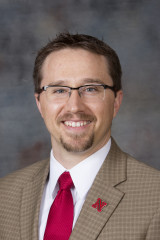You recently wrote an op-ed on the leadership example set by Gov. Jim Pillen’s recent decision to accept federal funding for a summer meals program. What prompted you to focus on this particular event and write the OpEd?
Part of it was that we had a Scholars Strategy Network op-ed training come to our campus where we were to bring a potential idea. And part of my role within my university is focusing on the Nebraska Rural Poll. The rural poll surveys rural Nebraskans every year and has done so for the last 28 years to get their ideas on their perceptions of their communities and Nebraska. We try to lift those voices to the rest of the state. This past year, we had some survey questions around civil discourse and the results to me seemed pretty alarming in that 94% of rural Nebraskans thought that we are much more divided today than we were 10 years ago. And I was trying to find a way to bring that kind of specific statistic to light but also to try to provide hope for a path forward. Writing this piece seemed like an opportunity to do that.
How did you get involved with the Nebraska Rural Poll?
I became a faculty member in 2014 and I have an extension appointment. The University of Nebraska, Lincoln is a land grant institution and so that means we have extension and outreach that serves our state and state stakeholders. The rural poll had been around for a number of years and I have an interest in polling and survey research. And so, the leader at that time brought me on as a new member. We poll Nebraskans each year. About half of our poll is something that we repeat each year focusing on community well-being and perceptions of their community and services within their community. And then we rotate topics every year and so I was able to start asking questions specifically about leadership and civic engagement.
You noted in your opinion piece that rural Nebraskans believed state political leaders to be over four times as likely to overcome differences to get things done when compared to America’s national political leaders. Based on your expertise, why do you think that is?
I don't think anyone would be surprised around the narrative of polarization. I get the impression that that feels pretty normal for folks across the country. And I think, but it's probably also true, like we found in our poll, that folks have more confidence in local leadership. That seems to be a place where people have, at least rural Nebraskans had, hope. And I would imagine that that's probably true more broadly as well.
The more we can tangibly see people working together, the more hope and optimism we have that that can function. It feels like the more removed we are or the more removed our leaders are, the more abstract it gets and the more we're allowing other sources of information to influence our perceptions, like the media or social media perhaps. And so those are filling in the gaps of unknown information whereas with local events, we have a lot more in-depth knowledge about that because we see it and we're experiencing it.
How does your expertise in leadership studies inform your perspective on the governor's decision? Do you anticipate more compromise from the governor or other representatives on this issue or others?
One of my hopes with writing the op-ed was to illustrate an example of how the interpersonal component of changing your mind or altering a decision or a stance based on new information would be something that we would consider very reasonable within an organizational setting, but there's actually a negative perception about that within politics. And so I was hoping to kind of expand the idea of what we would think of as effective decision making for leaders to that political realm, which is something that we sometimes struggle to see because of the nature of politics being the two-party system kind of at odds with each other at all levels of government.
Not only do I call for more compromise, but I think the Nebraska constituents call for more compromise. That was a specific component of our poll as well. One of the other reasons to call it out, and this is very much from a leadership perspective, is that if you're trying to influence other people’s behavior, one of the best things you can do is positively reinforce the behaviors you want to see. I think that's the call of seeing compromise happen in action. I hope my op-ed writing about that will help others to call out effective decision-making when they’re seeing it in our state politics or within their local politics and not to react to it as a flip-flop decision which in politics has a negative connotation. My hope is that more people can point out effective decision-making and then positively reinforce it so that it continues to happen.
One of the things that's really unique about Nebraska is the unicameral, the one body of government. That was something that was completely new to me. And I think in some ways that structure has actually created some benefit to relationship building that we might not see in other types of governance structures. I think we have historically seen compromise. The Nebraska Legislature is nonpartisan, in that there’s no part representation within the legislature. Though in practice, we know that there are Republicans and Democrats, but I think the de-emphasizing of that helps with people coming together to find more pragmatic solutions to the challenges that our state faces.
Your teaching and research focus on issues of leadership identity and development in communities. What motivates your involvement in this field of research, and could you elaborate on its relevance within the context of Nebraska?
Part of my motivation in engaging in this work is to try to help facilitate leadership development in others. One of the things in my current role within Nebraska that we see is that a lot of leadership development, specifically in rural communities, has to be locally grown because our rural communities aren't seeing the same type of influx of population as metro communities. And so what that means is that the people that are living there today are likely going to be the people that are living there in the next 10, 15, 20 years. And so when we think of sustainability for leadership, we're thinking a lot about how to grow leadership within the specific community that people reside in and help that kind of generational leadership development. That's not necessarily a focus in any other type of leadership development that I'm familiar with.
I think we're also obviously wrestling with figuring out how to increase the diversity of leadership and recognize that leadership can look different from how it is exhibited by different individuals and that we have all sorts of biases and implicit leadership expectations about what a leadership should look like. One of the goals for me is figuring out how to help more people see themselves as a leader and see how they can bring positive components to leadership.
Looking ahead, what are some key skills that policymakers can use to better serve the needs of rural communities in Nebraska?
I think one of the most important components for policymakers and I think a lot of our policymakers do a good job with this is to really listen and have empathy for the people that we're trying to work with and represent. I see this in my role as a University of Nebraska employee in that my job exists to support the stakeholders and that's the citizens of Nebraska. The reality is it's never a single voice that we're listening to and there's tensions in all of the diversity of voices that exist. Our role is to listen to that diversity and try to make sense of that diversity and bring together some level of coherence that addresses as many of the challenges that our stakeholders face as we possibly can.
Where do you hope to take your advocacy on this issue?
I would like to continue to write op-eds. This was a new thing for me and it was interesting to bring in my research frame to a practical kind of situation and that’s something I want to continue doing. One of the ways for engaging more with our legislature, or even just rural communities more broadly, is starting to write more policy briefs based on rural poll data and other information that we have around leadership and civic engagement. So figuring out how to help and provide specific guidance for folks across our state to become more effective in their governance and in their decision making as leaders.

